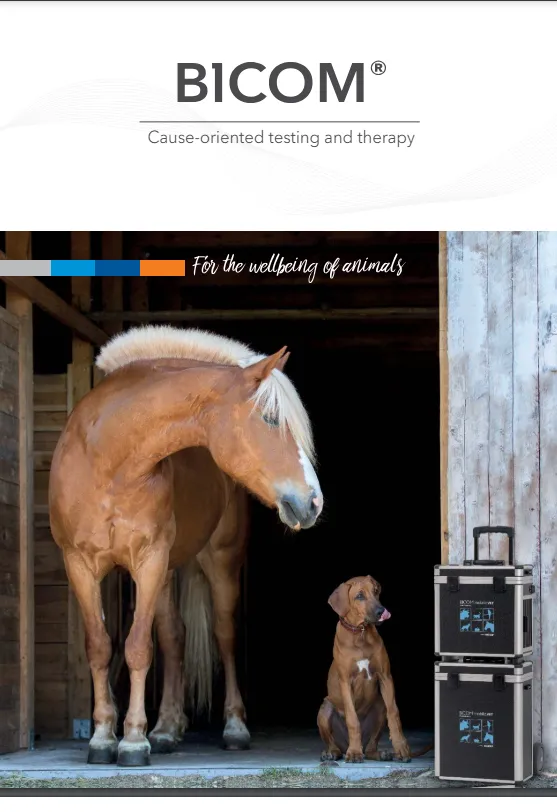BICOM® Bioresonance
Stress-free for pets and pet owners Suitable for all types of animals
There are many dogs , cats and horses suffering from health problems worldwide.
Be it problems with the musculoskeletal system, allergies and food intolerances or chronic diseases.
Sometimes, as an animal owner, you are at a loss when you can’t get any further with conventional therapy methods.
Like acupuncture or homeopathy, bioresonance belongs to the field of complementary medicine and is intended to be a useful supplement to conventional medicine.
It works with the body’s own wavelength of the four-legged friend, is used without medication and is painless to use.
Of course, not all health problems can be resolved with bioresonance. It is best to talk to a veterinarian or animal naturopath.
With our therapist finder you can find the nearest practice that can offer you BICOM® bioresonance.
Pain-free testing and therapy
Treatment with the BICOM® device is painless and stress-free. Especially sensitive animals feel very comfortable and it often happens that they completely relax and come to rest during the therapy.
Bioresonance has no harmful side effects and is used without medication.
Occasionally, initial aggravations, in what is known as the body’s initial reaction, can occur. However, these fade away after a short time.
What Pet Owners are saying..

Bioresonance And Allergic Rhinitis
Allergic Rhinitis, also commonly called hay fever, is an allergic reaction that the body experiences when exposed to particular types of allergens. The condition can be troublesome and have a considerable adverse impact on a person’s ability to perform certain day-to-day tasks, mostly due to the numerous symptoms that can be caused by the human body’s response after being exposed to a certain allergen. The symptoms that a person experiences after such exposure can vary from mild to more serious and intrusive symptoms. Some people experiences allergic rhinitis only at certain times of the year, while others have problems with the symptoms related to this condition during the entire year.
Types Of Allergic Rhinitis
Rhinitis is a term that refers to a wide variety of conditions. These can include infectious rhinitis, drug-induced rhinitis, hormonal rhinitis, occupational rhinitis and, what we want to focus on in this post, allergic rhinitis. Allergic rhinitis itself has also been divided into two different sections, and understanding these two types can help a particular individual experiencing the symptoms identify which type of allergic rhinitis they are suffering from. The American College of Allergy, Asthma & Immunology explains that up to 60 million people in the United States suffer from some type of allergic rhinitis. They continue to explain that the following are the two primary types of allergic rhinitis that can be diagnosed in a patient:
Seasonal Allergic Rhinitis – This particular type of allergic rhinitis is relatively self-explanatory – it refers to a patient who experiences the symptoms of allergic rhinitis at specific times of the year, usually when there is a change of season. These symptoms usually arise during spring and summer, as well as during the early weeks of fall.
Perennial Allergic Rhinitis – This type of allergic rhinitis refers to a condition where a person experiences the symptoms of this condition at all times – even when there is not a season change.
Symptoms Of Allergic Rhinitis
When a person develops allergic rhinitis and is exposed to a particular allergen to which their body has an allergic reaction to, then they can experience quite a large number of different symptoms. Not every person will experience the same symptoms or the same number of symptoms since each person’s response to a particular type of allergen will be different. Some will also experience more severe symptoms than another. According to Healthline, some common symptoms that people may experience when they develop allergic rhinitis include:
Runny or stuffy nose, as well as constantly sneezing. Their nose may also become itchy.
Coughing is relatively common as the allergic reaction may affect the respiratory tract.
Eyes may become itchy and watery. Dark circles may also develop underneath the eyes.
The throat may become scratchy or sore.
Headaches are also relatively common, especially with long-term exposure to allergens or when suddenly exposed to an excessive amount of allergens.
Allergic rhinitis also commonly causes excessive fatigue as a problematic symptom.
Some symptoms that are usually associated with eczema may also develop. This may include dry and itchy skin. Blisters can also develop on the skin.
Hives is another symptom that may be caused by allergic rhinitis.
It is important to note that, even though allergic rhinitis is commonly called hay fever, fever itself is not actually a symptom caused by this particular condition.
Bioresonance And Allergic Rhinitis
In the modern world, people are rather opting for alternative testing and treatment measures as opposed to visiting a doctor for a prescription of medication that may cause side-effects that could be unpleasant to them. Bioresonance therapy has become one of the most popular alternative forms of medicine in the world today. When a patient with allergic rhinitis utilizes bioresonance technology in seek of relief, they are able to obtain a complete overview of why they are experiencing the particular symptoms that are interfering with their daily lives.
Bioresonance therapy works by sending electromagnetic waves into the patient’s body. These waves have been pre-programmed to test the body’s response to certain allergens that may be causing the symptoms a particular patient is experiencing. The body then provides a feedback, also in the form of electromagnetic waves, to the bioresonance machine, which then interprets the body’s messages and delivers a complete report on what allergens need to be avoided for a relief of symptoms. Additionally, information regarding other sensitivities that might also be contributing to the symptoms can also be delivered through the use of a bioresonance machine.
Conclusion
Allergic rhinitis can cause numerous unpleasant symptoms, ranging from a runny or stuffy nose, to headaches that become present frequently. These symptoms can be problematic in a person’s day-to-day life, especially when paired with the excessive fatigue often experienced by patients who develop allergic rhinitis. With the use of bioresonance therapy, a complete analysis can be conducted to determine the particular allergens a person is experiencing allergic reactions to; thus providing the patient with a complete overview as to the particular allergens that need to be avoided in order to reduce both the frequency and the severity of the symptoms they are experiencing.
To find a vet near you please complete the form below
Quick Links








Facebook
Instagram
Mail